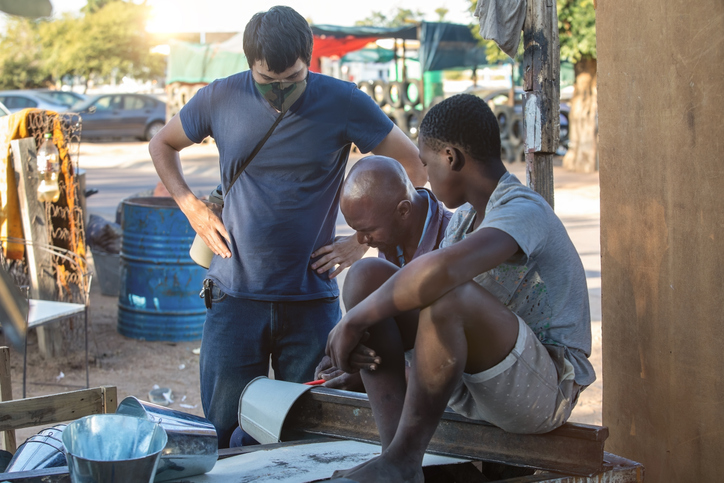
As we move into the spring and summer months, many houses of worship will be taking service and mission trips. These experiences offer unique opportunities to share faith, make a difference and strengthen the church community.
With careful planning, travelers can mitigate risk and keep the focus on their ministry during these trips.
Following is a conversation with Eric Spacek, assistant vice president — Risk Control at Church Mutual Insurance Company, S.I.1, who outlines several key steps you, your members and staff can take to stay safe and healthy.
What’s the best way to get started with planning?
The first step is to research and share information on public health and security issues in your destination. Of course, we all know right now the most prominent public health issue continues to be COVID-19, and conditions can evolve quickly as different strains emerge. Additionally, every state in the United States — not to mention every country — has different requirements in place for mask-wearing, social distancing, vaccination status, etc. To better understand risks and regulations, start with the COVID-19 travel recommendations from The Centers for Disease Control and Prevention (CDC). For security-focused information — such as identifying areas of unrest — the U.S. Department of State’s Overseas Security Advisory Council is a valuable, up-to-date resource for international travel.
What is typically required in terms of immunizations for travel? Do you have any other tips related to health or medical considerations while traveling?
Each country is different, so it’s important for travelers to think ahead and verify all needed immunizations using resources like CDC’s travel website. Travelers will need to see their doctor at least six weeks in advance, as some vaccines require that amount of time to reach their full amount of protection. Right now, we also recommend paying close attention to COVID-19 requirements both to enter other countries (which can include quarantining) and re-enter the U.S.
Another area of interest for travelers is prescription medication, which should be kept in its original packaging to avoid problems in customs. They should bring a sufficient supply to last throughout the trip as well as a paper copy of the prescription, in case it needs to be refilled while away from home.
What steps can travelers take to protect their passports and other important documents?
We recommend assembling an emergency identification kit, which should include a photocopy of the data page in their passport, an extra photo of themselves and the addresses and telephone numbers of the U.S. embassies in the countries they are planning to visit. This information should stay in the traveler’s possession, but it’s better to store it separately from their passport. Ideally, these pages should be laminated as well to protect them from damage.
In the unfortunate event that a passport is lost or stolen, having this information readily accessible can help the traveler obtain a new physical copy. Some travelers choose to take additional steps, such as storing a laminated copy of this information in every piece of their luggage, providing a copy to one of their travel companions and leaving a copy with a family member at home. For easy online access, they also may scan their passport and store a copy in a secure location on the cloud or their email account.
What should travelers know from an insurance standpoint? What’s covered during travel?
We recommend purchasing travel insurance to cover all the eventualities that can arise, such as:
- Trip delays or cancellations — Conditions can change quickly, especially with COVID-19 as a factor. Canceling a trip could result in losing the money spent on plane tickets and other reservations, but travel insurance would cover these costs.
- Lost or stolen passports — Securing a new passport requires time and resources. Travel insurance covers the costs of extending a trip and replacing the passport.
- Lost or stolen property — Travel insurance covers the cost of replacing or recovering the traveler’s belongings.
- Illness or injury — If the traveler’s personal insurance does not cover all health care expenses, travel insurance can help.
- Liability — Some, but not all, insurance products contain liability coverage. Check with your insurer to determine if your organization is adequately covered for liability, particularly if travelers will be driving a vehicle.
What do travelers need to know about driving in other countries?
It’s a good idea to explore all options for transportation while traveling, including public or privately arranged transportation. However, these options are not always safe and/or available, so travelers may need to rent and operate a vehicle during their trip.
The first thing to know is that some countries require visitors to have an International Driving Permit — check with the International Drivers Association for the list. This permit is translated into the nine official languages of the United Nations, including English, and is an important tool for drivers in an emergency situation.
Potential drivers also should research traffic laws and road conditions in their planned destinations to answer a few key questions. Will the roads be difficult to navigate due to being narrow or unpaved? Will drivers need to drive on the opposite side of the road while traveling? (For the latter, if it’s the first time they have done so, it may help to practice in an empty parking lot prior to the trip.) How do the rules of the road compare to the U.S.?
- Signage — Drivers should know what the basic colors and symbols mean.
- Restrictions — Different locations may regulate who can drive where and when, especially in areas with significant congestion.
- Driving culture — Attitudes and expectations around driving. As an example, travelers who drive below the speed limit are seen as a safety hazard in some places, while in others it’s the opposite.
While operating a vehicle in another state or country, travelers are implicitly accepting responsibility for anything that occurs while they are driving. Ignorance of the law will not be a legitimate defense. We recommend houses of worship contact their insurer to discuss any questions related to organizational liability.
It can be overwhelming to arrange travel to other countries — or even to coordinate travel here in the U.S. By planning ahead, travelers can set themselves up for success, mitigating potential risks and keeping the focus where it should be — doing God’s work and serving communities at home and abroad.
 Eric Spacek has more than 15 years of insurance risk control experience and joined Church Mutual in January 2020 as Risk Control program manager. He was promoted to his current role in January 2022. Spacek earned a bachelor’s degree in English from Eastern University in St. David’s, Pennsylvania, and his juris doctor degree from American University in Washington, D.C. Spacek earned the Associate in Risk Management (ARM) designation. He has also received the Cambridge Certificate in Risk Management for Churches and Schools. He serves on the board of directors of the Iowa Prayer Breakfast Committee and on the board of directors for the Friends of Youth Justice Initiative in West Des Moines, Iowa. Spacek attends Hope+Elim, a multi-cultural satellite location of Lutheran Church of Hope, in Des Moines, Iowa, and volunteers on the safety and security team.
Eric Spacek has more than 15 years of insurance risk control experience and joined Church Mutual in January 2020 as Risk Control program manager. He was promoted to his current role in January 2022. Spacek earned a bachelor’s degree in English from Eastern University in St. David’s, Pennsylvania, and his juris doctor degree from American University in Washington, D.C. Spacek earned the Associate in Risk Management (ARM) designation. He has also received the Cambridge Certificate in Risk Management for Churches and Schools. He serves on the board of directors of the Iowa Prayer Breakfast Committee and on the board of directors for the Friends of Youth Justice Initiative in West Des Moines, Iowa. Spacek attends Hope+Elim, a multi-cultural satellite location of Lutheran Church of Hope, in Des Moines, Iowa, and volunteers on the safety and security team.
1Church Mutual is a stock insurer whose policyholders are members of the parent mutual holding company formed on 1/1/20. S.I. = a stock insurer.
Views expressed in this article are solely those of the author and organization represented.


